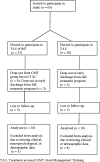An Open-Label Feasibility Trial Examining the Effectiveness of a Cognitive Training Program, Goal Management Training, in Individuals With Posttraumatic Stress Disorder
- PMID: 32440592
- PMCID: PMC7219918
- DOI: 10.1177/2470547019841599
An Open-Label Feasibility Trial Examining the Effectiveness of a Cognitive Training Program, Goal Management Training, in Individuals With Posttraumatic Stress Disorder
Abstract
Background: Posttraumatic stress disorder (PTSD) is associated with dysfunction across multiple cognitive domains including executive functioning, attention, and verbal memory. This dysfunction is associated with negative impacts on functional outcomes (e.g., work or social functioning) and reduced response to psychotherapy for PTSD. Despite this knowledge, little work has investigated the efficacy of cognitive remediation strategies in improving cognition and functional outcomes among individuals with PTSD.
Objective: The current study investigated the efficacy of an established cognitive remediation program, Goal Management Training (GMT), in improving cognitive functioning in a pilot sample of individuals with PTSD symptoms in an inpatient treatment setting.
Method: Thirty-four inpatients with PTSD symptoms participated in either GMT in addition to treatment as usual (TAU; consisting of psychiatric management, group and individual psychotherapy) (TAU+GMT; n = 18) or TAU alone (n = 16). The TAU+GMT group received neuropsychological assessment at baseline and posttreatment, while both the TAU+GMT and TAU groups received assessment with clinical self-report measures at baseline and posttreatment.
Results: Paired-sample t-tests revealed significant improvements on measures of executive functioning (e.g., response inhibition, cognitive flexibility), processing speed, sustained attention, and verbal memory in the TAU+GMT group. Mixed-design analyses of variance (ANOVAs) revealed a trend toward an interaction effect indicating potentially greater improvements on a measure of the ability to engage in goal-directed behaviors while highly emotional in the TAU+GMT group as compared to the TAU group.
Discussion: The results of this small feasibility investigation of GMT in PTSD point toward the potential efficacy of GMT in ameliorating cognitive difficulties in individuals with PTSD.
Keywords: Goal Management Training; cognitive dysfunction; cognitive remediation; emotion regulation; posttraumatic stress disorder.
© The Author(s) 2019.
Conflict of interest statement
The author(s) declared no potential conflicts of interest with respect to the research, authorship, and/or publication of this article.
Figures
References
-
- Kessler RC, Sonnega A, Bromet E, Hughes M, Nelson CB. Posttraumatic stress disorder in the national comorbidity survey. Arch Gen Psychiatry 1995; 52: 1048–1060. - PubMed
-
- Olatunji BO, Cisler JM, Tolin DF. Quality of life in the anxiety disorders: a meta-analytic review. Clin Psychol Rev 2007; 27: 572–581. - PubMed
-
- Kessler RC. Posttraumatic stress disorder: the burden to the individual and to society. J Clin Psychiatry 2000; 61: 4–12. - PubMed
-
- Greenberg PE, Sisitsky T, Kessler RC, et al. The economic burden of anxiety disorders in the 1990s. J Clin Psychiatry 1999; 60: 427–435. - PubMed
LinkOut - more resources
Full Text Sources
Medical


